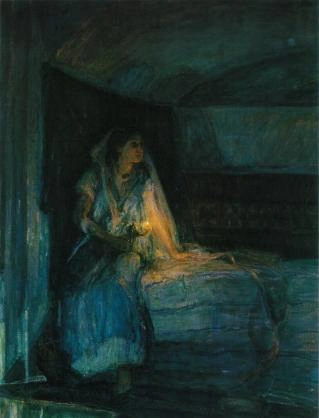1
A-đam ăn ở với Ê-va, là vợ mình; người thọ thai sanh Ca-in và nói rằng: Nhờ Ðức Giê-hô-va giúp đỡ, tôi mới sanh được một người.
2
Ê-va lại sanh em Ca-in, là A-bên; A-bên làm nghề chăn chiên, còn Ca-in thì nghề làm ruộng.
3
Vả, cách ít lâu, Ca-in dùng thổ sản làm của lễ dâng cho Ðức Giê-hô-va.
4
A-bên cũng dâng chiên đầu lòng trong bầy mình cùng mỡ nó. Ðức Giê-hô-va đoái xem A-bên và nhận lễ vật của người;
5
nhưng chẳng đoái đến Ca-in và cũng chẳng nhận lễ vật của người; cho nên Ca-in giận lắm mà gằm nét mặt.
6
Ðức Giê-hô-va phán hỏi Ca-in rằng: Cớ sao ngươi giận, và cớ sao nét mặt ngươi gằm xuống?
7
Nếu ngươi làm lành, há chẳng ngước mặt lên sao? Còn như chẳng làm lành, thì tội lỗi rình đợi trước cửa, thèm ngươi lắm; nhưng ngươi phải quản trị nó.
8
Ca-in thuật lại cùng A-bên là em mình. Vả, khi hai người đương ở ngoài đồng, thì Ca-in xông đến A-bên là em mình, và giết đi.
9
Ðức Giê-hô-va hỏi Ca-in rằng: A-bên, em ngươi, ở đâu? Thưa rằng: Tôi không biết; tôi là người giữ em tôi sao?
10
Ðức Giê-hô-va hỏi: Ngươi đã làm điều chi vậy? Tiếng của máu em ngươi từ dưới đất kêu thấu đến ta.
11
Bây giờ, ngươi sẽ bị đất rủa sả, là đất đã hả miệng chịu hút máu của em ngươi bởi chính tay ngươi làm đổ ra.
12
Khi ngươi trồng tỉa, đất chẳng sanh hoa lợi cho ngươi nữa; ngươi sẽ lưu lạc và trốn tránh, trên mặt đất.
13
Ca-in thưa cùng Ðức Giê-hô-va rằng: Sự hình phạt tôi nặng quá mang không nổi.
14
Nầy, ngày nay, Chúa đã đuổi tôi ra khỏi đất nầy, tôi sẽ lánh mặt Chúa, sẽ đi lưu lạc trốn tránh trên đất; rồi, xảy có ai gặp tôi, họ sẽ giết đi.
15
Ðức Giê-hô-va phán rằng: Bởi cớ ấy, nếu ai giết Ca-in, thì sẽ bị báo thù bảy lần. Ðức Giê-hô-va bèn đánh đấu trên mình Ca-in, hầu cho ai gặp Ca-in thì chẳng giết.
16
Ca-in bèn lui ra khỏi mặt Ðức Giê-hô-va, và ở tại xứ Nốt, về phía đông của Ê-đen.
17
Ðoạn, Ca-in ăn ở cùng vợ mình, nàng thọ thai và sanh được Hê-nóc; Ca-in xây một cái thành đặt tên là Hê-nóc, tùy theo tên con trai mình.
18
ồi, Hê-nóc sanh Y-rát; Y-rát sanh Nê-hu-đa-ên; Nê-hu-đa-ên sanh Mê-tu-sa-ên; Mê-tu-sa-ên sanh Lê-méc.
19
Lê-méc cưới hai vợ; một người tên là A-đa, một người tên là Si-la.
20
A-đa sanh Gia-banh; Gia-banh là tổ phụ của các dân ở trại và nuôi bầy súc vật.
21
Em người là Giu-banh, tổ phụ của những kẻ đánh đờn và thổi sáo.
22
Còn Si-la cũng sanh Tu-banh-Ca-in là người rèn đủ thứ khí giới bén bằng đồng và bằng sắt. Em gái của Tu-banh-Ca-in là Na-a-ma.
23
Lê-méc bèn nói với hai vợ mình rằng: Hỡi A-đa và Si-la! hãy nghe tiếng ta; Nầy, vợ Lê-méc hãy lắng tai nghe lời ta: Ừ! Ta đã giết một người, vì làm thương ta, Và một người trẻ, vì đánh sưng bầm ta.
24
Nếu Ca-in được bảy lần báo thù, Lê-méc sẽ được bảy mươi bảy lần báo oán.
25
A-đam còn ăn ở với vợ mình; người sanh được một con trai đặt tên là Sết; vì vợ rằng: Ðức Chúa Trời đã cho tôi một con trai khác thế cho A-bên mà đã bị Ca-in giết rồi.
26
Sết cũng sanh được một con trai, đặt tên là Ê-nót. Từ đây, người ta bắt đầu cầu khẩn danh Ðức Giê-hô-va.







